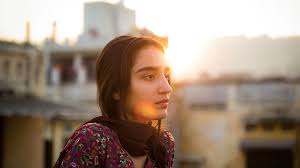Eye For Film >> Movies >> What Will People Say (2017) Film Review
What Will People Say
Reviewed by: Maryam Ghorbankarimi

What will people say (2018) is the second film by Iram Haq, a Norwegian filmmaker of Pakistani descent, and the film’s script is known to be derived from some of her personal experiences. This beautifully shot and acted film is an intimate coming-of-age tale of Nisha (Maria Mozhdah), who is stuck between two cultures and two sets of values. A first-generation Norwegian teenager of Pakistani descent, she struggles to lead a double life: pursuing a ‘normal’ teenage life among her friends outside the house, whilst simultaneously trying to embody at home the image of the perfect daughter of a traditional Pakistani Muslim family.
Nisha lives with her parents (Adil Hussain and Ekavali Khanna) and her older brother and younger sister. From the beginning it is clear that she has a close bond with her father, Mirza, who owns a grocery store. He is depicted as respected by both his Pakistani and Norwegian customers. Nisha’s mother, on the other hand, is portrayed as cold and more concerned with other people’s perception of her family than she is with caring for them. Rather, it is Mirza who lovingly checks on the children every night after they have gone to bed. Then, after her father’s check, Nisha sneaks out every night to party with her friends. However, on one occasion, her adolescent carelessness leads to her sneaking her Norwegian boyfriend into her bedroom. But his ill-timed loud mobile ringtone awakes the family and Mirza, in a state of shock, violently attacks them, resulting in Nisha being brought into the custody of social services.

Her father, who believes she has lost her virginity and therefore both her own and her family’s honour, proposes marriage as the solution to her disgrace – an old Islamic tradition to restore the girl’s honour in such an instance. Whilst Nisha insists that nothing happened between them and that she has already broken up with him, nothing can change her family’s mind. Very quickly, this simple adolescent slip turns into a moral case which one would imagine could end up in an ‘honour killing’, due to the Pakistani community’s pressure on her father.
From this point on, the film teases the audience with suspense and one awaits Nisha’s death in every corner. After she has been lured out of social care, she is taken on a lengthy journey which finally brings her to Pakistan, abandoned with her aunt who lives some 200 miles outside Islamabad. Locked up like a prisoner, she tries to escape several times, but this only results in her aunt becoming stricter. After a while, she gives in and stops trying. A moment of relief is introduced into the plot when she finally comes to terms with her family’s culture and begins to assimilate. An innocent and somewhat beautiful romance develops between Nisha and her handsome cousin. However, this short-lived romance is blown up in her face when they are caught kissing by the police and, in an unbelievable and harrowing scene, they are sexually assaulted and set up in a scam to blackmail the family for money.
This event triggers her father’s return, as the relatives are no longer willing to shelter her. Her father comes to Pakistan and is more conflicted than ever. His pain is echoed in his eyes and in Adil Hussein’s skilful acting. He literally walks her to the edge of death – the edge of a cliff – to force her to jump and set them free from all the disgrace, but he cannot bring himself to do it. This cathartic moment is one of the most effective scenes of the film, for it becomes apparent that it is really Mirza who is caught between the two worlds, and Nisha merely the sacrificial lamb. He then brings her back to Norway, in a way giving her the opportunity to run away and free herself from the nightmare she has become entangled in. But it is he who remains behind the window, imprisoned in the home away from home he has forged, leaving her to run free into the world she really belongs to.
Although this film begins by catering to some of the stereotypical assumptions of what would happen to girls like Nisha in an honour-based culture, it goes beyond the stereotypes and offers a fresh point of view which people can absorb and integrate. In fact, this film might be seen as more of a journey for Mirza than for Nisha. Nisha is a fully-fledged Norwegian teenager who gets trapped in her family’s struggle to belong to a new culture, while blindly attempting to preserve their old one.
Reviewed on: 04 Aug 2018

















